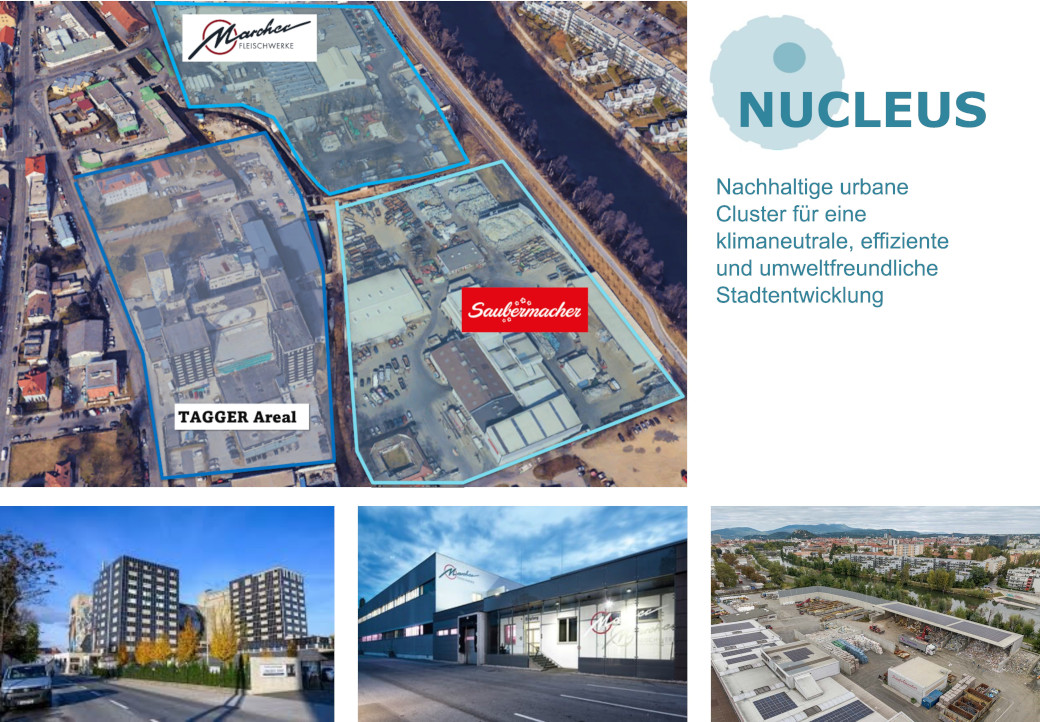NUCLEUS - Sustainable Urban Clusters for Climate-Neutral, Efficient, and Eco-Friendly Urban Development
Short Description
Starting point / motivation
The implementation of climate-neutral districts is a key component of European climate goals but is associated with significant challenges. Positive Energy Districts (PEDs) offer great potential for sustainable urban development, particularly when they interact with surrounding energy and urban systems. However, in practice, both regulatory and technical issues hinder widespread implementation.
The NUCLEUS project examines these challenges using the Tagger Areal in Graz, one of the city's four climate pioneer districts, as a case study. The aim is to analyse regulatory uncertainties and develop technical solutions for intercompany exchange of electricity, heat, and cooling.
Existing barriers will be identified, and a model solution will be developed, serving as a foundation for a subsequent demonstration project. By linking energy producers and consumers in urban areas, the project seeks to create a model that can be transferred to other districts and accelerate the energy transition.
Contents and goals
The exploratory project pursues three key research objectives to assess the feasibility of Positive Energy Districts (PEDs) and establish the basis for a subsequent demonstration project:
- Analysis of energy potentials and demands: The Tagger Areal in Graz serves as a model district to examine available renewable energy sources and the energy demands of relevant industrial partners such as Saubermacher and Marcher Fleischwerke. The assessment of electricity, heat, and cooling flows allows for the identification of synergies to improve energy distribution.
- Examination of the regulatory framework: While legislation in the field of energy communities has already significantly opened up direct exchange models in the electricity sector, comparable models for heat and cooling networks are lacking. NUCLEUS analyses existing legal frameworks and develops proposals for new tariff and compensation models to facilitate cross-sectoral energy exchange.
- Development of viable energy concepts: Based on the findings of the first two objectives, concrete supply concepts for the district will be developed. An economic evaluation will be carried out to ensure that the proposed solutions are practical and replicable.
Methods
The energy availability and demands of the involved stakeholders are recorded through workshops, interviews, and direct measurements. The analysis includes not only current values but also planned developments to provide a well-founded assessment of potential. Additionally, existing legal frameworks are examined, particularly in the area of energy communities. New billing and compensation models are evaluated to identify regulatory hurdles and derive recommendations for action.
Based on these findings, viable energy supply concepts are developed, taking ecological and economic criteria into account. Various energy exchange models are tested through simulations and modelling calculations and assessed for their economic viability. This enables an estimation of the impacts on the urban energy system. Finally, the developed concepts are evaluated for feasibility and prepared for a subsequent demonstration project to ensure practical application of the solutions.
Expected Results
The NUCLEUS project develops practical concepts for integrating Positive Energy Districts into existing urban structures. The identified technical and regulatory solutions enable optimized energy distribution and new business models for cross-sectoral energy exchange. The developed concepts form the basis for a demonstration project and contribute to the long-term implementation of climate-neutral urban districts.
Project Partners
Project management
AEE INTEC
Project or cooperation partners
- Johanneum Research
- Stadt Graz
- BAR Vermögensverwaltungs GmbH
- Saubermacher
- Marcher Fleischwerke
Contact Address
DI Michael Gumhlater
Feldgasse 19
A-8200 Gleisdorf
Tel.: +43 (3112) 5886-227
E-mail: m.gumhalter@aee.at
Web: www.aee-intec.at

